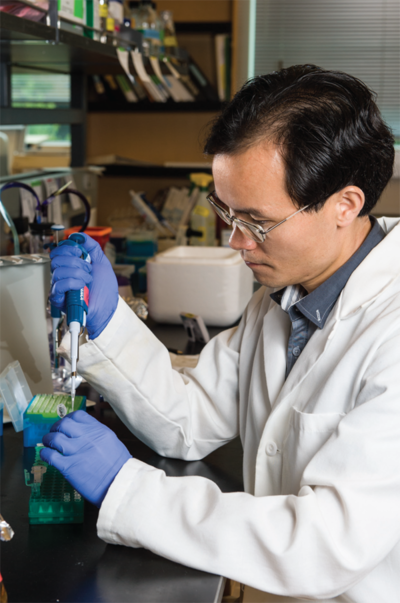
The American Cancer Society estimates that 142,670 people will die from lung cancer in the United States in 2019. The disease is the second-most common cancer in both men and women. It is the leading cause of cancer death, as more people die from lung cancer each year than colon, breast, and prostate cancers combined.
Researchers in the Department of Biochemistry and Molecular Biology at the Wright State University Boonshoft School of Medicine are trying to make a difference in those figures. They are led by Weiwen Long, Ph.D., associate professor in the department.
“ERK3, the gene of my interest, happens to be important for the normal physiology of lungs,” Long said. “It is overexpressed in lung cancer, particularly squamous cell lung carcinoma.”
Long is motivated to study the gene, in part, because he has lost several close friends and relatives to lung cancer. But learning more about the gene’s role also will reveal more about the healthy function of lungs in general.
To study the role that ERK3 plays in lung cancer progression and metastasis, Dr. Long and researchers in his lab are using a combination of techniques. He is assisted by postdoctoral fellows and students at Wright State University.
The scientists use a combination of biochemical techniques, including mass spectrometry to study proteins involved in the spread of lung cancer. They are using lung cancer cell-based assays to evaluate cell growth and migration. The team also is using gene targeting and immunohistological analysis of ERK3’s expression in tumor specimens.
“These techniques allow us to reveal the roles of ERK3 in cancer cell growth and invasion in vitro and tumor growth and metastasis in vivo, as well as the underlying molecular mechanisms,” Long said.
So far, the scientists have found that ERK3 plays a very important role in the spread of lung cancer. The gene also appears to lend the disease more strength against drugs that are used to treat lung cancer.
“We have found that ERK3 promotes lung cancer cell invasiveness and tumor growth and metastasis in vivo,” Long said. “In addition, ERK3 is found to confer lung cancer’s cellular resistance to chemotherapeutic drugs, such as etoposide.”
In future work, Dr. Long and his team will work to illuminate the molecular mechanisms underlying ERK3’s protein kinase activation and the roles it plays in furthering lung cancer cell growth and invasiveness. Significantly, they will attempt to assess how these contribute to the progression of lung cancer.
“The road to success in science is never a straight line. We have had some issues along the way. Despite these difficulties, our project has been going well overall,” Long said. “Our long-term goal is to define the role of ERK3 as a new diagnostic marker or therapeutic drug target.”
Funding for the research has been provided by a National Cancer Institute R01 grant and the Wright State University startup fund.
— Daniel Kelly

